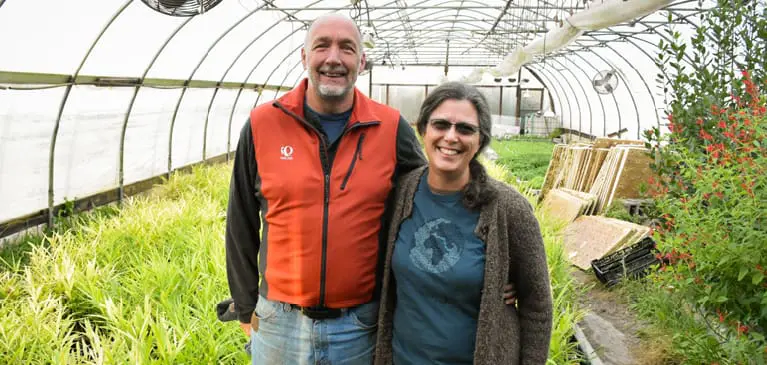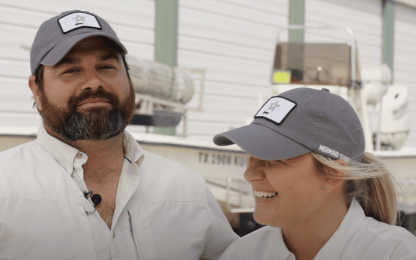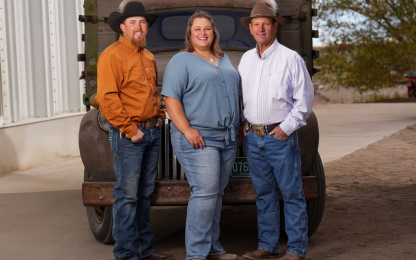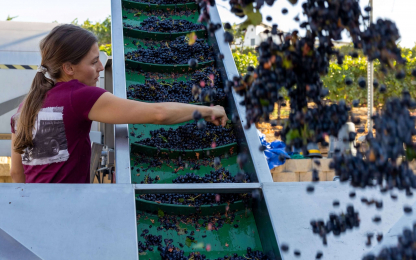“We believe in sustainable agriculture, and we’re looking forward to exploring more ideas to make it even more sustainable.” Kris Van Haitsma
Starting Sustainably
Steve and Kris Van Haitsma are committed to sustainability and environmental responsibility, which stems in part from Kris’ background in environmental chemistry.
“I graduated with a biology degree from Calvin University,” Kris said, “and I started working as a lab tech in an environmental testing lab. As a chemist for the next 18 years, I worked on quality control, testing for things like pesticides and herbicides.”
Steve was raised on an organic farm, so he was already familiar with the farming philosophy free of pesticides and herbicides. Also a Calvin graduate, he owned his own appraising business before transitioning full-time to the farm.
With those backgrounds, the couple began Mud Lake Farm by buying used greenhouses and moving them to their property. The Van Haitsmas have four greenhouses and 36 acres, plus they grow using hydroponics. The land where they farm was in Steve’s family for 117 years, and most of that time it was cattle pasture. When they were getting ready to move to it, they envisioned being able to have all the inputs to grow and produce.
Giving it a Try
“It’s a difficult thing to figure out how to do, and this was before the internet,” Kris said. “We were doing all the research with books, and we thought – let’s try hydroponics.”
They built ponds in the greenhouses that are insulated, and they use PEX tubing that runs from a geothermal system to heat the water, much like a floor heating system. Their ponds have foam floats that float on top of the water, and the roots grow into the water to draw the nutrients from it. No weeding is required, and they’re able to use all the growing area. As a result, they’re also not losing water to evaporation, because the surface is covered.
“We use about 10% of the water to grow hydroponically that we would use to grow traditionally,” Kris said.
Currently, they have between 6-10 hydroponic beds in each of their greenhouses, and they also build other beds outside in the summer. With this system, they’re able to harvest 600-800 pounds of lettuce a week in the summer.
Along with hydroponic lettuce, they use their greenhouses to grow microgreens, a variety of herbs, rosemary, pineapple sage, mint, ginger, and chamomile. Outside, they grow arctic kiwis, hazelnuts, elderflowers and berries, and much more.
“We’re always trying something new,” Kris said. “Last year we planted 100 yellow birch trees to use as a flavoring for our root beer.”
Cordials and Sodas
After making their mark in the produce arena, the couple decided to expand into a new venture.
“For our wedding anniversary we went to Wales,” Steve said. “We tried elderflower “pressé” (which is a fancy French word for soda), and we thought – we can make this!”
They went to their friends at Cascade Winery in Grand Rapids and used their canning equipment to make elderflower soda.
“We were told we were the first ones in the states to make elderflower soda,” Steve said. “It’s my favorite one. Not only do you get all the benefits of the elderflower, in that it’s good for cold and flu, but it’s also a fun beverage that you can use to make cocktails.”
They were already growing ginger for chefs and decided to try making ginger cordial with it instead. It went so well, they also made a ginger soda. Since then, they have added a root beer made with natural ingredients, including carrots, beets, and a chamomile soda from their fresh chamomile flowers.
They now produce beverages made with the fresh ingredients from their farm, and they sell under the name St. Steve’s Cordials & Sodas.
“The main thing is we’re using real ingredients to make it, and it comes from here,” Kris said. “We use our fresh elderberries, elderflowers, chamomile, ginger, birch bark.
We have a limited number of ingredients because we want just fresh, simple ingredients. Most ginger ales and ginger beers don’t even have real ginger in them, so we see this as an opportunity to give people an amazing soda that still provides the functional benefits of using the real plant.”
“We have lots of people who buy our products just for the health benefits,” Steve added. “People going through cancer treatments love the ginger. People who struggle with sleeping love the chamomile. It so neat to make something that people really appreciate. We get so much amazing feedback from our customers.”
Financing Opportunity
They soon looked into purchasing a canner for their own business.
“We’ve always had conventional loans before, and other banks didn’t want to work with us because we were now a farm,” Steve said. “We talked to Matt Alt, and it really seemed to fit together with what we were trying to do and what GreenStone offered.”
Matt Alt is a financial services officer out of GreenStone’s Grand Rapids branch. When Kris and Steve contacted him, they asked about a house refinancing loan, but also additional funds for a canner.
“It was such a unique situation, as they are growing the throughput and then producing the craft
soda with it,” Matt said. “It was an exciting loan to help with, because it was obvious the benefits the canner would bring to their business.”
Matt added that when he visited the farm, it happened to coincide with a day his branch was meeting up for a potluck, so he brought a case of craft soda.
“We tried a bunch of different flavors, and it was a hit,” Matt said. “I’m glad we were able to help with their soda creation.”
In January 2021, Steve and Kris used GreenStone to finance their canning line, and they now are able to can their sodas and sparkling waters on the farm on their own schedule, producing 24 cans a minute.
Sustainability First
Steve and Kris have designed their farm around sustainability measures.
They use LED lighting to provide supplemental light in their greenhouses. They heat the water in the hydroponic beds with a geothermal system, and they also use a biomass furnace to heat the air over the cooler months. For a heat source, they burn cherry pits that they buy from a supplier in Shelby, Michigan.
“We tried different materials like corn, and wood pellets, but they had issues like leaving residue and attracting rodents,” Steve said.
“We also had an issue that corn is a food source. With cherry pits, they’re a carbon neutral product, they’re produced every year, and they’re also a complete waste product. We buy 15 tons of them every winter.”
Steve and Kris have a strong online presence, have won many awards, and have built a successful business with their produce and beverages.
“We believe in sustainable agriculture, and we’re looking forward to exploring more ideas to make it even more sustainable,” Kris said.



